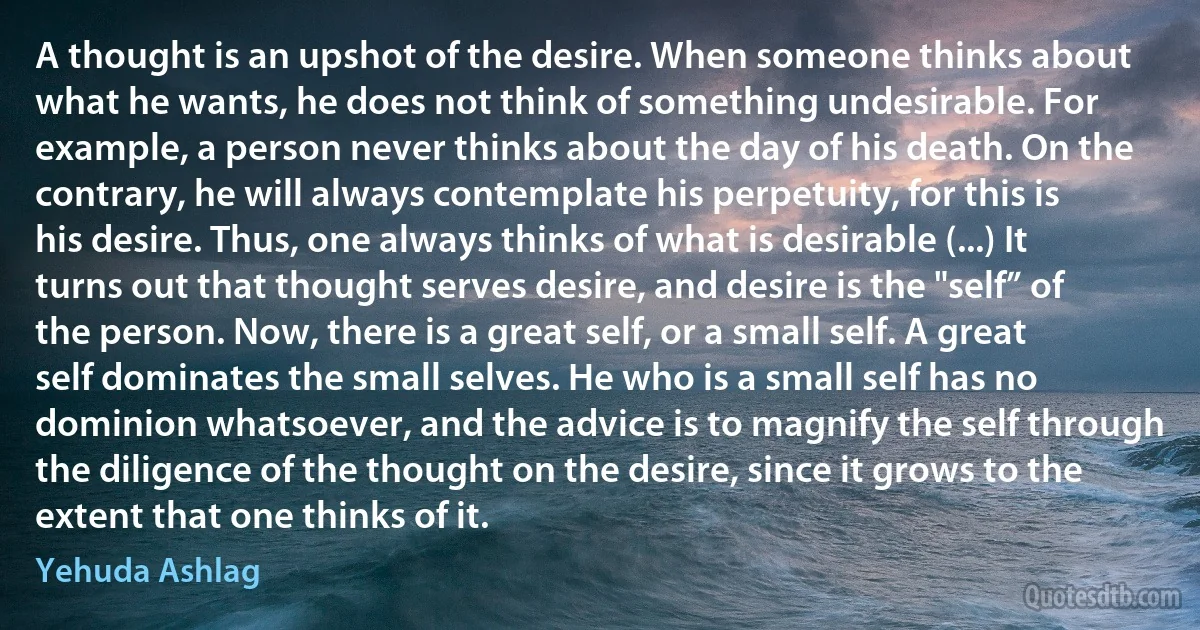
A thought is an upshot of the desire. When someone thinks about what he wants, he does not think of something undesirable. For example, a person never thinks about the day of his death. On the contrary, he will always contemplate his perpetuity, for this is his desire. Thus, one always thinks of what is desirable (...) It turns out that thought serves desire, and desire is the "self” of the person. Now, there is a great self, or a small self. A great self dominates the small selves. He who is a small self has no dominion whatsoever, and the advice is to magnify the self through the diligence of the thought on the desire, since it grows to the extent that one thinks of it.
Yehuda AshlagRelated topics
advice day death desire diligence example great now perpetuity person self small something thought think thus upshot someoneRelated quotes
From the Leftist point of view isolated ghettoes mainly populated by isolated immigrant groups are an ideal solution. Complete dependency on the political left makes the immigrant population loyal supporters of the left. Because the ghettoes are isolated, they only disturb the image of well-being in Sweden to an extent that can be covered up with effective media self-censorship and "education”. At the same time the dependence of the political Left on the ghettoes not only prevents it from taking any effective measures to stop the ghettoization (you cannot criticize your voters) but also makes stopping the ghettoization undesirable.

Jussi Halla-aho
Tiredness and fatigue are effects caused by ignorance of Nature and disobedience to her inexorable law. You may command Nature to the extent only in which you are willing to obey her. You cannot intelligently obey that which you do not comprehend. Ask of Nature that you may be one with her and she will whisper her secrets to you to the extent in which you are prepared to listen. Seek to be alone much to commune with Nature and be thus inspired by her mighty whisperings within your consciousness. Nature is a most jealous god, for she will not whisper her inspiring revelations to you unless you are absolutely alone with her.

Walter Russell
Fascism, since that is the word that is used, fascism presents, wherever it manifests itself, characteristics which are varied to the extent that countries and national temperaments vary. It is essentially a defensive reaction of the organism, a manifestation of the desire to live, of the desire not to die, which at certain times seizes a whole people. So each people reacts in its own way, according to its conception of life. Our rising, here, has a Spanish meaning! What can it have in common with Hitlerism, which was, above all, a reaction against the state of things created by the defeat, and by the abdication and the despair that followed it?

Francisco Franco
All government rests upon consent, and consent is not to be had without taking counsel with the most eminent or influential or representative of the governed, and seeking their advice: the act of taking counsel cannot be separated from the act of exercising authority. All government rests also upon upon habit, upon being exercised in the same way or a similar way to that in which the governed remember or believe that it was exercised before. Brute force can break with habit; but as soon as brute force begins to turn into government, it does so by starting to observe habitual modes of behaviour. Habitual forms or institutions for counsel and consent are thus of the essence of government.

Enoch Powell
We must allow every day of our lives to represent healthy closure now! When we live for love, this is most natural because all of our associations will be quality associations in which we share our compassion, determination, and realizations, and receive the same from others. This is the technology of how to celebrate life now and live with proper preparation and detachment, so that we will master the science of dying before dying so as to connect with the should and its home-the spiritual world. After all, death is to remove all that is false and secondary. I am that lowly beggar who is desperately trying to die before dying.

Bhakti Tirtha Swami
